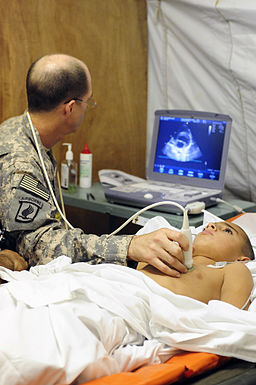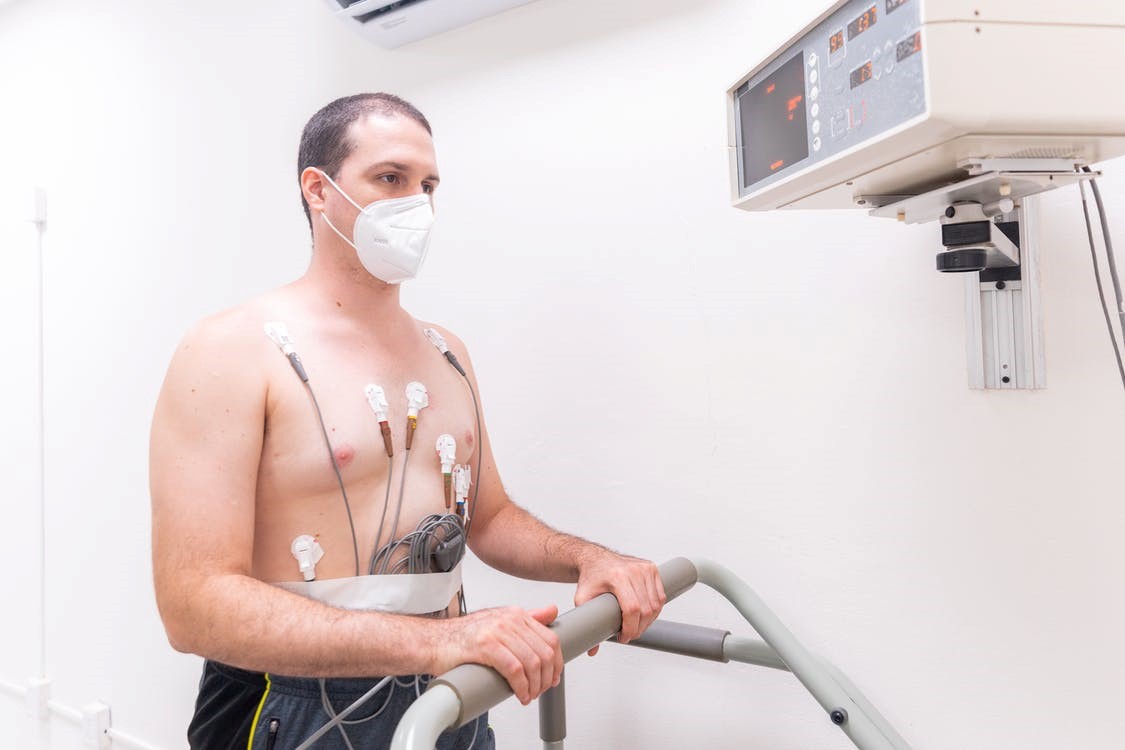Echocardiogram
Peer reviewed by Dr Colin Tidy, MRCGPLast updated by Dr Toni Hazell, MRCGPLast updated 22 Nov 2022
Meets Patient’s editorial guidelines
- DownloadDownload
- Share
- Language
- Discussion
- Audio Version
An echocardiogram is an ultrasound scan of the heart. It is sometimes just called an 'echo'. Ultrasound is a very high-frequency sound that you cannot hear but it can be emitted and detected by special machines. The scan can give accurate pictures of the heart muscle, the heart chambers and structures within the heart such as the valves.
In this article:
Video picks for Heart tests
Continue reading below
What does an echocardiogram show?
An echocardiogram can be carried out for many different reasons. It may be done to check how well your heart is working after major heart problems such as a heart attack, or to look at how well the valves are moving inside the heart. An echocardiogram can also help to see any fluid that may have collected around the heart and may be used to see if symptoms such as shortness of breath are caused by a cardiac cause such as heart failure.
How accurate is a echocardiogram?
Interpreting an echocardiogram is a skilled job. The sonographer will interpret the images and write a report, which will be sent to the requesting clinician (GP or consultant). In some cases a consultant may want to carry out an echocardiogram themselves, to get a first-hand look at the images.
How is an echocardiogram done?
Back to contentsThe test is painless and takes about 15-30 minutes. You may have to turn on to your side during the test so that the operator can scan the heart from different angles.
You will need to undress to the waist and lie on the couch. A probe is placed on your chest (it is a bit like a very thick blunt pen). Also, a substance called a contrast agent (lubricating jelly) is put on your chest so the probe makes good contact with the skin. The probe is connected by a wire to the ultrasound machine and monitor. Pulses of ultrasound are sent from the probe through the skin towards your heart. The ultrasound waves then 'bounce back' (echo) from the heart and various structures in the heart.
Echocardiogram procedure

© Tech Sgt Luke Thelen, via Wikimedia Commons
By Tech Sgt Luke Thelen, via Wikimedia Commons
The echoes are detected by the probe and are sent to the echocardiogram machine. They are displayed as a picture on the monitor. The picture is constantly updated so the scan can show movement as well as structure. (For example, the valves of a heart opening and closing.) The operator moves the probe around over the skin surface to obtain views from different angles. Some abnormalities can be seen quite clearly. For example, damaged heart valves, thickened heart muscle, some congenital heart defects, etc.
You do not need any special preparation before the test. You eat and drink normally before and after the test. Continue to take your usual medication.
Continue reading below
Doppler echocardiography
Back to contentsThis type of echocardiogram can measure variations in blood flow through your heart. For example, if can detect any abnormal blood flows next to a damaged valve. It can assess how well the heart valves are working. You do not need any special preparation before this test.
Stress echocardiogram
Back to contentsThis test is done to show how well your heart responds to 'stress' such as exercise. In this test your doctor may do an echocardiogram, as described above, during or soon after exercise. Or you may be given a medication that causes the heart to beat harder and faster.
Continue reading below
Transoesophageal echocardiogram
Back to contentsIn this test you swallow a probe that is attached to a thin tube connecting it to an ultrasound machine. This views the heart from within the gullet (oesophagus) which lies just behind the heart. This can give a clearer view of the heart than normal echocardiography. It is done in situations where a very detailed picture is needed. For example, to assess valves before surgery is done to repair damaged valves, or to assess the extent of infection of a heart valve.
How long does it take to get echocardiogram results?
Back to contentsThis varies locally. Results will go back to the requesting clinician and it is their responsibility to give them to the patient. So, if your echocardiogram was requested by a consultant, do not ring your GP for the result. Wait for your next consultant appointment, where you will get the result, or ring your consultant's secretary if you have a query. Hospital consultants should not ask patients to go to their GP for the results of tests that the consultant has requested.
Patient picks for Heart tests

Tests and investigations
Ambulatory electrocardiogram
Ambulatory electrocardiogram monitors your heart when you are doing your normal activities. It helps to detect abnormal heart rates and rhythms (arrhythmias). The arrangements, and the way tests are performed, may vary between different hospitals. Always follow the instructions given by your doctor or local hospital.
by Dr Toni Hazell, MRCGP

Tests and investigations
Exercise Tolerance Testing
An exercise tolerance test (ETT) records the electrical activity of the heart whilst exercising. It is most useful in patients who experience chest pain on exertion. It is also used to detect whether heart rhythm abnormalities can be brought on by exercise.
by Dr Philippa Vincent, MRCGP
Further reading and references
- Sengupta PP, Khandheria BK; Transoesophageal echocardiography. Heart. 2005 Apr;91(4):541-7.
- Mohamed AA, Arifi AA, Omran A; The basics of echocardiography. J Saudi Heart Assoc. 2010 Apr;22(2):71-6. doi: 10.1016/j.jsha.2010.02.011. Epub 2010 Mar 1.
Continue reading below
Article history
The information on this page is written and peer reviewed by qualified clinicians.
Next review due: 21 Nov 2027
22 Nov 2022 | Latest version

Ask, share, connect.
Browse discussions, ask questions, and share experiences across hundreds of health topics.

Feeling unwell?
Assess your symptoms online for free
Sign up to the Patient newsletter
Your weekly dose of clear, trustworthy health advice - written to help you feel informed, confident and in control.
By subscribing you accept our Privacy Policy. You can unsubscribe at any time. We never sell your data.